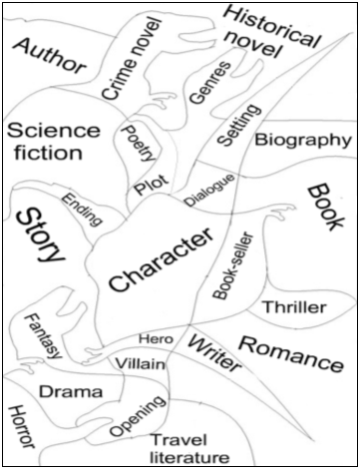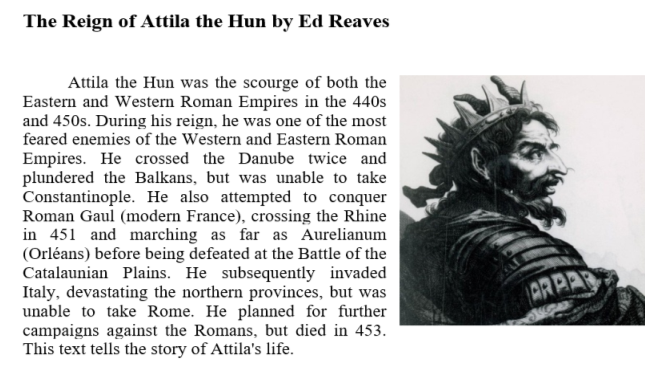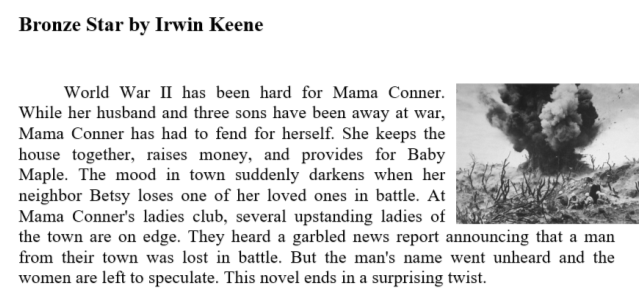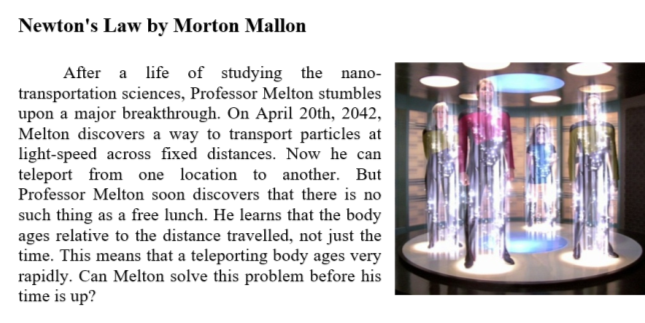Learning objectives:
– to use appropriate subject-specific vocabulary to talk about a range of general topics, and some curricular topics;
– to plan, write, edit and proofread work at text level with little support on a range of general and curricular topics.
Lesson objectives:
All learners will be able to:
– recognize and use the vocabulary of book genres;
– understand the general writing structure of a book review.
Most learners will be able to:
– talk about book genres;
– write a book review using a writing guide.
Some learners will be able to:
– produce extended sentences talking about book genres;
– write a book review without support.
Success criteria
By the end of the lesson students will:
– write a book review using a writing guide with tips (weak students);
– write a book review using a writing guide (medium students);
– write a book review without any support (strong students).
1. Beginning (6 minutes):
– Introduction (1 minute)
The Teacher greets students, sets the lesson objectives, letting students know what to anticipate from the lesson.
–Group — division (1 minute):
Students are divided into 3 mixed groups of 4 persons. (Puzzle pieces)
–Warming up (4 minutes):
Each group completes the painting by words (see Pic. 1). Students should guess the words from their definitions and find them in the picture. Using a pencil, they shade the field where these words are located.
(COLLABORATIVE LEARNING — group work)
Definitions:
– The story of a film, play, etc.
– A person in a story
– The last part of a story
– The main (usually good) Character in a story
– A character who harms other people
– The words that the characters say to each other
– The beginning of a story
– The time and place in which the action happens

Fig. 1. The painting by words
If the answers are correct, they will see a dinosaur. The groups check each other's work. (PEER-ASSESSMENT)
2. The main part of the lesson (32 minutes):
–Lead-in (2 minutes)
The teacher asks students to find some new words in the other fields in the previous task. Then the teacher asks students to find one word, which can describe these words as a group. (It helps them to identify the theme of the lesson).
Suggested answer: genres
–Pre-reading (5 minutes):
Matching task (ex.1 p.75).
Directions: Match the genres with book covers. Write letters A-I in the table. Then listen and check.
|
|
|
|
|
|
|
|
|
|
|
|
|
|
|
|
|
Answers: A-3 B-8 C-7 D-5 E-4 F-6 G-1 H-9 I-2
–Reading (8 minutes)
The teacher tells students they are going to read three texts about different books. Students continue working in three groups. Each group is given one text about one type of book.

Fig. 2. The first text

Fig.3. The second text

Fig. 4. The third text
They have 5 minutes to read the text and fill the following table:
|
Nameofthebook |
Author |
Genre |
Explain your answer |
Descriptors:
- Read the text
- Identify the genre in which the story most likely belongs and explain your answer to complete the table.
- Complete the table
Pay attention! Do not write the whole sentences! Only specific information!
Then groups exchange texts twice and complete the same table about the other two types of stories. (COLLABORATIVE LEARNING — group work)
–Post-reading (5 minutes)
After completing the whole table, the teacher asks one student from each group to explain and argue their choices. Then they exchange their answer sheets and check each other's work according to the criteria. Students are given the sheets of paper with the answers. (PEER-ASSESSMENT)
Assessment criteria
– the answers are right;
– the answers are short and specific.
–Writing (12 minutes)
Teacher gives different writing tasks for students:
– Weak students write a book review using a writing guide with tips.
The example for weak students:
Recently I have read……………(title). It’s a /an……. (genre), written by………… (author), and it is really……………… (opinion). The action takes place in………. (place), in …… (time). The main character is……............ (name), who works………… (job). He/she is................... (description of the character). The story tells about …………………………………....... (plot).
– Medium students write a book review using a writing guide without tips.
The example for medium students:
Recently I have read…………………… It’s a/an……………….written by………………, and it is really………. The action takes place in…………, in …………………. The main character is………………............, who works……………… He /she is……………… The story tells about ………………
– Strong students write a book review without any support. (DIFFERENTIATION BY THE TASK)
Then students hand in their works to the teacher.
3. Ending (2 minutes):
–Pair share
At the end of a lesson learners share with their partner:
– Three new things they have learned;
– What they found easy;
– What they found difficult;
– Something they would like to learn in the future.







